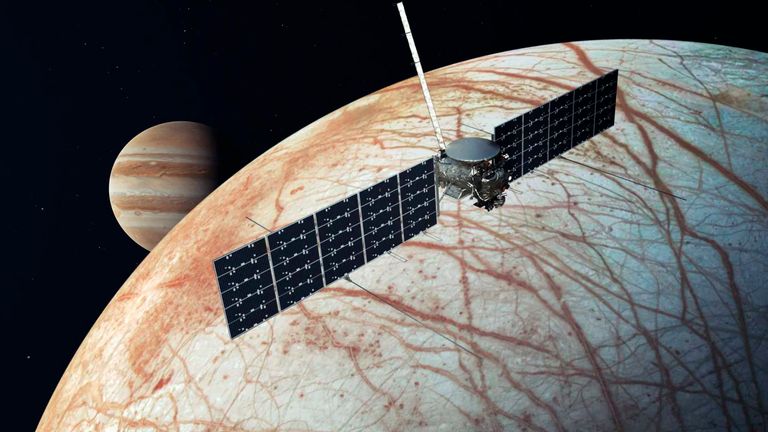Ever since the Galileo spacecraft flew by Jupiter’s icy moons in 1989, scientists interested in life beyond our planet have been desperate to go back.
Europa Clipper, which blasted off from Kennedy Space Center at Cape Canaveral, is doing just that.
Galileo found clear evidence that while Ganymede, Calisto and Europa have barren frozen surfaces, beneath them likely lie vast oceans of water.
And, as far as any astrobiologist knows, where there’s water there’s a chance of life.
Kept liquid by Jupiter’s huge tidal forces, Europa’s ocean may be the Solar System’s largest.
Up to 100 miles deep, containing twice the volume of water in all Earth’s oceans, this ocean makes it a prime candidate for exploration.
After a six-year, 1.8 billion-mile journey, Europa Clipper – the largest planetary science mission ever launched by NASA – will spend four years orbiting Jupiter making flybys of its icy moon.
It will use nine instruments to image the surface of the moon to study its atmosphere, measure the thickness of the icy crust, confirm the presence of the ocean and attempt to measure its depth and saltiness.
But before we get too excited, if there’s life on Europa, Europa Clipper won’t “see” it squirming around beneath the ice.
First, the crust is thought to be at least 10 miles thick, too deep for the weak Sun at Jupiter to penetrate.
Without photosynthesis, if life exists, it is expected to be more akin to the bacteria that lurk in the blackness around hydrothermal vents deep on the sea floor here on Earth.
On Europa, it may live off geothermal heat, or even Jupiter’s radiation fields for energy, and simple organic molecules for food.
But we’re getting beyond Europa Clipper’s remit, which is to confirm whether the environment on the moon is compatible with these theories.
A major bonus would be whether Europa Clipper spots a plume of water erupting from the surface of the moon, which it is known to do on other icy moons. That would mean the chemicals present in the water below can be analysed directly.
“If there are life-forming conditions we expect they’re deep down in the dark,” said Dr Adam Masters, a space scientist at Imperial College London.
“So when the water comes to you, that saves a lot of hassle,” he said.
The chances of getting answers are doubled however. Dr Masters works on another mission, the European Space Agency’s Jupiter Icy Moons Explorer (JUICE).
It arrives at Jupiter shortly after Europa Clipper and will study Europa as well as another prime candidate for life, Jupiter’s moon Ganymede.
But even if these missions find tantalising chemical evidence of life, confirming its existence, let alone understanding its alien biology, would be decades away.
For that reason, one of the probes’ other objectives is to look for potential landing sites on one of these icy moons.
If Europa Clipper and JUICE finds evidence that Jupiter’s moons have the right conditions for life, the challenge for future space scientists will be figuring out how to get through miles of ice to see it.



























